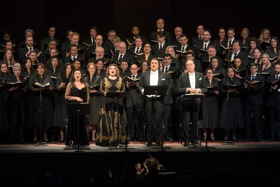Review: The Met's Great Orchestra and Chorus Spark the Majestic Verdi REQUIEM

with soloists Stoyanova, Semenchuk, Antonenko and
Furlanetto. Photo: Richard Termine/Metropolitan Opera
It was a fitting gesture that the Met dedicated this season's performances of Verdi's MESSA DA REQUIEM to the great baritone Dmitri Hvorostovsky, who died on November 22 of brain cancer, at 55. The Russian Hvosotovsky may not have had the largest voice ever heard in his chosen repertoire--the last time I heard him was in IL TROVATORE with Netrebko--but it was unquestionably distinctive and exciting to hear. And he was a powerful stage presence second to none-something that the Met has found difficult to muster from its soloists these days.
Of course, the inclusion of the REQUIEM on this year's schedule at the Met was a fortuitous (from a programming standpoint at least) but stopgap occurrence, replacing a new production of LA FORZA DEL DESTINO by Calixto Beixto that saved $1 million according the GD Peter Gelb, but was also sure to have had a rough go of it. When it debuted at the English National Opera (ENO) in London two years ago, it presented a bleak vision that people either loved or hated, featuring some of the controversial touches that Beixto is known for (eg, a secondary character, the gypsy Preziosilla, kicks a pregnant woman in the stomach).
Heard at the second performance of the short run, I found the Met's REQUIEM something of an oddity--not from a musical standpoint, of course, since it debuted around the time of AIDA and had some vivid echoes of the composer's operatic output, including the OTELLO yet to come. When I last heard it at Geffen Hall, with the New York Philharmonic and Alan Gilbert front and center, I couldn't imagine it presented any other way, but here it was, with the orchestra and conductor James Levine hidden in the pit. I'm not quite sure why the Met has chosen this tradition--which is, indeed, normal for opera but an unusual configuration for a piece where the orchestra plays such an important role.
But there was no hiding the excellence of the Met's house band, nor of their colleagues in the Met chorus, directed by Donald Palumbo, who filled the stage. Together, particularly in "Dies Irae" and "Tuba Mirum" sections, they were powerful and thrilling enough to raise the hairs on the back of my neck. The choral work in the eight-part fugue of the "Sanctus," at the middle of the work, was inspiring. Levine may not have led a performance for all time, but he kept things moving along.
I found the soloists--soprano Krassimira Stoyanova, mezzo Ekaterina Semenchuk, tenor Aleksandrs Antonenko and bass Ferruccio Furlanetto--a somewhat problematic mix. In all Stoyanova did best, spinning out some beautiful lines, floating notes when appropriate and bringing out the best in her duets with mezzo Semenchuk. Stoyanova may not be the most engaging singer but she was certainly a reliable one in this performance. I couldn't tell whether the loud "boo" from the audience when she finished the "Libera me" at the tail end of the piece was supposed to be for her or a comment on the performance as a whole. In either case, it was certainly not deserved.
Mezzo Semenchuk took a long time to warm up--unfortunately, way too long for a piece only 85 minutes long--but when she did, her duets with Stoyanova in the "Recordare" and "Agnus Dei" were moving. Bass Furlanetto, who's pretty far along in a distinguished career, started off strongly, reminiscent of his powerful King Phillip in Verdi's DON CARLO (his "Ella giammai m'amo" is a classic), but soon began producing an unmodulated tone. Last, and I'm afraid least for me, was tenor Antonenko, who showed off a big, raw sound through much of the performance, with only glimpses of the possibilities that the tenor role had to offer.
***
The season's last Verdi REQUIEM will be performed at the December 2 matinee at 1 pm, running one hour and 24 minutes without an intermission.
Tickets begin at $25; for prices, more information, or to place an order, please call (212) 362-6000 or visit www.metopera.org. Special rates for groups of 10 or more are available by calling (212) 341-5410 or visiting www.metopera.org/groups.
Same-day $25 rush tickets for the REQUIEM are available on a first-come, first-served basis on the Met's Web site. For more information on rush tickets, click here.
Reader Reviews
Videos

